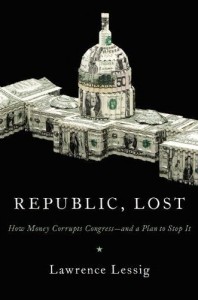I have recently finished reading a book Republic, Lost by Lawrence Lessig which addresses the question, “Why doesn’t Congress work?”  The book is written in accessible style with a number of examples, but what makes it particularly compelling is that Lessig makes clear the dynamics of the present unhappy situation.
The book is written in accessible style with a number of examples, but what makes it particularly compelling is that Lessig makes clear the dynamics of the present unhappy situation.
Here, in brief, are some of the important factors the book brings out. Most readers may be acquainted with them. However they seem to make more of an impression when assembled and trotted out as a kind of parade of the guilty.
The first thing to keep in mind is the importance of Congress. Congressmen (and congresswomen) pass our laws. They have tremendous influence on the state of the country and the economy. The obvious consequence is that a lot of people who have strong interests in the economy — large corporations, unions, billionaires, etc. — would very much like to be “friends” with Congress.
A second factor is that congressmen can earn a lot more out of office than in it. Rank-and-file members of the House and Senate are paid $174,000 per year, and for most of us, this seems magnificent. But there are lots of people working for big corporations, foundations, and what-have-you that earn quite a bit more. And a congressman would like to be able to send his children to Harvard or Yale, and he does not want his time in Congress to end up as a vacation he took from the serious business of advancing his career. (See, for example, this article from Slate.)
Now a congressman is (generally) not an idiot. He (or she) cannot help but think of the fact that it may not be in his best interests to continue for more than a few years in Congress. And he cannot help but realize that landing a good job after Congress may depend on the good will of the people is dealing with as a congressman. He may, for example, be tempted to become a lobbyist; this is a natural sequel to a legislative career. And a rewarding one. One attempted investigation of how congressmen-turned-lobbyists are treated (and this is a hard thing to investigate) arrived at the astounding conclusion that in their new jobs, they received an average increase in salary of 1,452 per cent. (See this article from Republic Report.)
As a third factor, a similar thing can be said about congressional staff. Staff are absolutely essential not only for things like typing and correspondence but because the congressman often does not have time to keep on top of the details of the complex issues that he has to deal with. Staff does this for him. The experience and connections that staff members pick up can be just as valuable in outside jobs — such as lobbying — as the experience and connections that congressmen acquire. The highest ranking staff members earn salaries in the low six figures, but most of them earn somewhere around forty to fifty thousand a year. Much as congressmen, staff know that being particularly nice to corporations and people with money who want to influence legislature could turn out to be beneficial to their long-run career.
Fourth factor: The costs of campaigning for election have become astronomical. Think of opinion polls, phone campaigns, and television. Another factor that drives costs is that a candidate for a congressional office must be able to match the funds and resources of his opponents; if he cannot do this, he is dead.
Congressmen are well aware of this. One hears estimates that congressmen spend fifty per cent or more of their time on the job raising campaign funds. That is time they do not have for the problems and complaints of the people who elected them.
A fifth factor is that extensive gerrymandering across the country and the terrible expense of election campaigns makes it very difficult for any kind of citizens’ movement to challenge the established politicians’ lock on Congress.
Of course Lessig in his book goes into much more detail than here. The important thing is that he makes it clear why both wealthy elements of the country and the Congress have a big stake in the present dysfunctional system. This, as Lessig points out, will make the problem very difficult to deal with.
But on a final note, he is very clear that we should not think of congressmen as corrupt. By and large, they are not guilty of taking money to vote for Bill X, and they do not go into Congress looking for how much money they can get away with. They sincerely want to serve their country. Rather, we should think of them as addicts. They are placed in an environment which is strongly corrosive of their principles, and if they cannot do right, then they may well hypnotize themselves into believing that evil is good.
Now although Professor Lessig points out how difficult — perhaps impossible! — it will be to heal our congressional disease, what he shares with us is still worth hearing. After all, the first step in breaking the wizard’s spell is to start paying attention to the man behind the curtain.